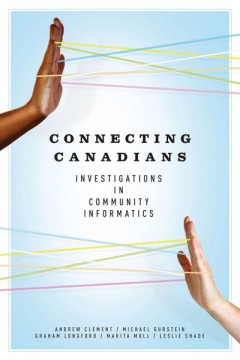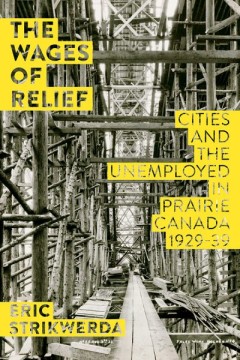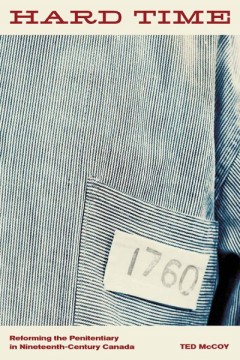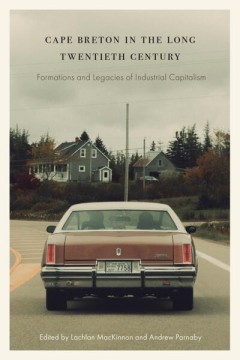Filter by

Connecting Canadians Investigations in Community Informatics
Funded for four years by the SSHRC’s Initiative for the New Economy, CRACIN systematically studied a wide variety of Canadian community ICT initiatives, bringing perspectives from sociology, computer science, critical theory, women’s studies, library and information sciences, and management studies to bear on networking technologies. A comprehensive thematic account of this in-depth researc…
- Edition
- -
- ISBN/ISSN
- 978-1-926836-04-1
- Collation
- -
- Series Title
- -
- Call Number
- 518 pages

The Wages of Relief Cities and the Unemployed in Prairie Canada, 1929–39
Setting municipal relief administrations of the 1930s within a wider literature on welfare and urban poor relief, Strikwerda highlights the legacy on which relief policymakers relied in determining policy directions, as well as the experiences of the individuals and families who depended on relief for their survival. Focusing on three prairie cities—Edmonton, Saskatoon, and Winnipeg—Strikwe…
- Edition
- -
- ISBN/ISSN
- 978-1-927356-05-0
- Collation
- -
- Series Title
- Working Canadians: Books from the CCLH
- Call Number
- 333 pages

Hard Time Reforming the Penitentiary in Nineteenth-Century Canada
Tracing the rise and evolution of Canadian penitentiaries in the nineteenth century, Hard Time examines the concepts of criminality and rehabilitation, the role of labour in penal regimes, and the problem of violence. Linking the lives of prisoners to the political economy and to movements for social change, McCoy depicts a history of oppression in which prisoners paid dearly for the reciprocal…
- Edition
- -
- ISBN/ISSN
- 978-1-926836-96-6
- Collation
- -
- Series Title
- -
- Call Number
- 349 pages

Cape Breton in the Long Twentieth Century Formations and Legacies of Industr…
The emergence, dominance, and alarmingly rapid retreat of modernist industrial capitalism on Cape Breton Island during the “long twentieth century” offers a particularly captivating window on the lasting and varied effects of deindustrialization. Now, at the tail end of the industrial moment in North American history, the story of Cape Breton Island presents an opportunity to reflect on how…
- Edition
- -
- ISBN/ISSN
- -
- Collation
- -
- Series Title
- -
- Call Number
- 6 x 9, 500 pages

Legal Literacy An Introduction to Legal Studies
While Legal Literacy is an introductory text, it also challenges students to consider critically the system they are studying. Touching on significant socio-legal issues such as access to justice, legal jargon, and plain language, Zariski critiques common legal traditions and practices, and analyzes what it means “to think like a lawyer.” As such, the text provides a sound basis for those w…
- Edition
- -
- ISBN/ISSN
- 9781927356449.01
- Collation
- -
- Series Title
- OPEL (Open Paths to Enriched Learning)
- Call Number
- -

Hard Time Reforming the Penitentiary in Nineteenth-Century Canada
Tracing the rise and evolution of Canadian penitentiaries in the nineteenth century, Hard Time examines the concepts of criminality and rehabilitation, the role of labour in penal regimes, and the problem of violence. Linking the lives of prisoners to the political economy and to movements for social change, McCoy depicts a history of oppression in which prisoners paid dearly for the reciprocal…
- Edition
- -
- ISBN/ISSN
- 978-1-926836-96-6
- Collation
- -
- Series Title
- -
- Call Number
- -
 Computer Science, Information & General Works
Computer Science, Information & General Works  Philosophy & Psychology
Philosophy & Psychology  Religion
Religion  Social Sciences
Social Sciences  Language
Language  Pure Science
Pure Science  Applied Sciences
Applied Sciences  Art & Recreation
Art & Recreation  Literature
Literature  History & Geography
History & Geography